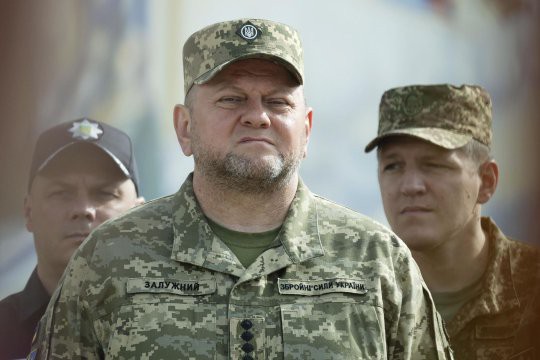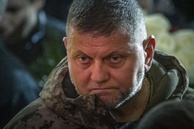The dismissal of Ukraine’s top military commander, General Valery Zaluzhny, ended weeks of tension and speculation about his fate. However, the ex-commander of the Armed Forces of Ukraine and his supporters failed to convert this tension into a political or social resource simply because support posts on social networks can hardly be called as such.
There had been attempts to discredit Zaluzhny before the whole resignation issue came along, with all kinds of hearsay about the “resignation already a done deal.” Suffice it to mention rumors that Zaluzhny had accepted an offer to become Ukraine’s ambassador to the UK, which popped up right ahead of his actual dismissal. Information about such an offer allegedly made to the general had appeared even before that.
Even though Valery Zaluzhny has not yet become a politician and has not shown any relevant qualities during his limited publicity, some people were already busy building a political career for him, hence his strange activity in foreign media, his interviews, articles, including in The Economist. They did manage to solve the task of discrediting Zelensky though with the ex-commander-in-chief almost directly criticizing the president’s intentions to continue active hostilities. Who are these people? That’s a good question.
However, against the backdrop of external efforts to build Zaluzhny’s career, a dangerous situation had started to emerge as all this was accompanied by his growing popularity in a war-weary society and the armed forces, increasing his attractiveness to potential sponsors in Ukrainian politics. I suppose this whole situation was making the Western puppeteers happy, save for the emergence of a core of military supporters for the commander. This was fraught with a possible military rebellion, the consequences of which would be hard to control, especially since Zaluzhny, in his publications in the foreign media, appeared as someone advocating a reduction in the level of military confrontation with Russia due to the lack of both manpower and arms. There were fears that in the worst-case scenario the military rebels might even enter into separate (not coordinated with the West) negotiations with Russia. It cannot be ruled out that this was one of the arguments that Zelensky used when explaining to the Western supervisors his decision to sack Zaluzhny.
Having solved the “Zaluzhny problem” technically, Zelensky moved on to solving his main political problem of hanging on to power. On February 6, the Verkhovna Rada approved the President’s decree to extend martial law for 90 days, until May 13 - a period of time that made it impossible to launch a presidential election campaign in the country. President Zelensky’s term in office ends on March 31, 2024.
In this context, Zaluzhny’s resignation is not a question of personality, but a question of power mechanisms. Zaluzhny actually gained from this whole situation, putting squarely on Zelensky’s shoulders all responsibility for the mobilization and the mobilization law (for the adoption of which he did not show up in parliament), as well as responsibility for the failure of the counteroffensive, which the ex-commander-in-chief had now pushed to the realm of political, rather than military, decisions. General Zaluzhny thus absolved himself of much of the negativity stemming from the lack of progress at the front. Even better, he became a “Hero of Ukraine.” Thus far, these have been the most noticeable political acquisitions for “no politician” Zaluzhny. Future problems at the frontline will now be he the problems for the new commander-in-chief Alexander Syrsky, the author of the Debaltsevo cauldron (2015), the Bakhmut “meat grinder” (2023), and the defense of Avdiivka. [i]
However, while introducing General Syrsky, President Zelensky spoke about his other distinctions: “He has successful defense experience - he conducted the Kyiv defense operation. He also has successful offensive experience - the Kharkov liberation operation.” Regarding the Kyiv operation, the thing is that the Russian forces withdrew from Kyiv as a gesture of goodwill, as part of the joint work on the Istanbul Agreements.
It is symptomatic that in his statement about Zaluzhny’s resignation, Zelensky thus tried to play out the situation with responsibility for the situation on the battlefield: “We must honestly say that the feeling of stagnation in the southern areas and the difficulties in the fighting in the Donetsk region have affected the public mood. Ukrainians began to talk less often about victory.” [ii] This is a clear attempt to blame military failures and, as a consequence, a decrease in trust in the authorities, on the ex-commander-in-chief.
From the standpoint of significance for what is going at the frontlines, this is simply a replacement of one top military commander with another. Well, the overarching issues, however, are arms supplies and political decisions that determine the level of armed confrontation. However, Zelensky went ahead with reshuffles in the army, [iii] diligently increasing the level of loyalty to himself in the army leadership and dismantling Zaluzhny’s support network in the army ranks. This is all being done to eliminate the threat of the army’s participation in a possible rebellion. Since this is what the West fears too, it means that their interests here coincide.
Valery Zaluzhny’s transformation into a politician is possible only if he gets the resources necessary to carry out political activities, such as structures (formal - party structures, informal - political technology structures, human resources, finance and the media). Right now, if Zaluzhny’s sponsors try to provide him with such resources, they will face a significant risk, since this would give Zelensky ample reason for a clampdown.
The right time for openly betting on Zaluzhny has passed, and a new situation is not ripe yet. A clear evidence of this is the weak socio-political reaction and the lack of resistance to Zaluzhny’s dismissal, despite the high level of trust in the ex-commander, which was constantly discussed in the Ukrainian media and social networks, and recorded by sociologists.
According to the results of a November 2023 survey by the Ukrainian sociological group “Rating,” the general level of public trust in Zaluzhny is 82 percent, compared to 72 percent for President Zelensky. If presidential elections were held today, Zelensky would receive 47.4 percent in the first round, and Zaluzhny would garner 30.7 percent. In the second round, the votes would be divided almost equally, with 42 percent going to Zelensky, and 40 percent – to Zaluzhny. [iv] This comes at a time when Zaluzhny’s political actions are only the publications he has made in foreign media. This means that if active work began to build up Zaluzhny’s political career, his rating would go up.
The story with Valery Zaluzhny’s resignation shows just how Zelensky and his team used the weakness of the Biden administration to eliminate internal Ukrainian threats to themselves. That such threats really exist was evidenced by the reaction to the articles and news stories about Zaluzhny’s resignation, and the reaction from representatives of the Ukrainian body politics:
- The leader of the Batkivshchyna faction in parliament, Yulia Tymoshenko, spoke in defense of Zaluzhny amid rumors about his possible resignation. She also emphasized that one of the problems of Ukraine, along with corruption, unprofessionalism and the lack of “fair mobilization,” is the removal of professionals and patriots from positions of authority. [v]
- MPs from the European Solidarity party of ex-President Petro Poroshenko criticized Zelensky for the replacement of the commander-in-chief of the country’s armed forces: “An erroneous decision that will have consequences for the state and the people. Zaluzhny’s resignation will be a death sentence for the authorities.” [vi]
These statements indicate the scope of Zaluzhny’s political support and the list of his possible political partner-sponsors. However, as I mentioned before, the time for Zaluzhny’s transformation into a politician and his provision with appropriate resources has passed, and the time for another try has not yet come.
March 31 is the final day of President Zelensky’s term in office, and it may kick-start a campaign against him. The range and activity of participants in this protest campaign against the “usurper Zelensky” will show whether Zaluzhny will enter politics. This depends on whether the ex-commander will or will not write articles in the foreign press, start publishing in Ukrainian media, or will work on social media platforms.
This round goes to Zelensky on the strength of the dominant position in parliament maintained by his Servant of the People faction, and their control of the media. Zelensky’s position, de facto declared to the West, is not new: do you want us to fight? If you do, then it is up to me to remove Zaluzhny and install loyal officers. Syrsky will not write articles for The Economist; he will fight “until the last Ukrainian,” just like you want, and how he will fight depends on Western funding and arms supplies.
As for Zaluzhny, he has not yet become a politician, nor has he become a rebel. Therefore, he goes into a state of political conservation, a “sleeper” mode until Zelensky’s term is out in the end of March, and, possibly, longer – hanging like a sword of Damocles over Zelensky’s head; or waiting for the right moment from the Western standpoint to initiate a change of power in Kyiv.
How strong are Zelensky’s political positions in this situation? The answer is simple - exactly as long as he suits the West. Everyone understands this.
The views of the author are his own and do not necessarily reflect the position of the Editorial Board.
--------------------------------------------------------------------------
[ii] https://ren.tv/news/v-mire/1188844-perestanovki-v-vsu-chto-izvestno-o-novom-glavkome-syrskom
[iii] https://tass.ru/mezhdunarodnaya-panorama/19956365
[iv] https://tass.ru/mezhdunarodnaya-panorama/19439191
[v] https://tass.ru/mezhdunarodnaya-panorama/19870383
[vi] https://tass.ru/mezhdunarodnaya-panorama/19940119
read more in our Telegram-channel https://t.me/The_International_Affairs

 11:49 13.02.2024 •
11:49 13.02.2024 •
























